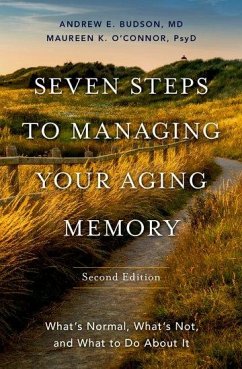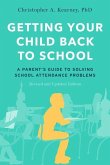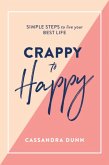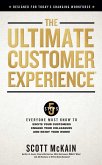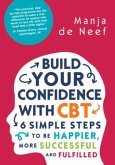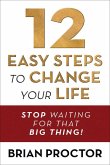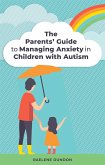Andrew E. Budson (Chief of Cognitive & Behavioral Neurology at the, Maureen O'Connor (Bedford Veterans Adm Director of Neuropsychology
Seven Steps to Managing Your Aging Memory
What's Normal, What's Not, and What to Do About It
Andrew E. Budson (Chief of Cognitive & Behavioral Neurology at the, Maureen O'Connor (Bedford Veterans Adm Director of Neuropsychology
Seven Steps to Managing Your Aging Memory
What's Normal, What's Not, and What to Do About It
- Gebundenes Buch
- Merkliste
- Auf die Merkliste
- Bewerten Bewerten
- Teilen
- Produkt teilen
- Produkterinnerung
- Produkterinnerung
Seven Steps to Managing Your Aging Memory helps individuals determine whether their aging memories are normal or not, when they need to see their doctor, what evaluation their doctor should do, which medications can actually improve their memory, as well as the diets, exercise, strategies, and memory aids that can augment their memory function in daily life.
Andere Kunden interessierten sich auch für
![Getting Your Child Back to School Getting Your Child Back to School]() Christopher A. Kearney (Dist Distinguished Professor of PsychologyGetting Your Child Back to School34,99 €
Christopher A. Kearney (Dist Distinguished Professor of PsychologyGetting Your Child Back to School34,99 €![Crappy to Happy: Simple Steps to Live Your Best Life Crappy to Happy: Simple Steps to Live Your Best Life]() Cassandra DunnCrappy to Happy: Simple Steps to Live Your Best Life15,99 €
Cassandra DunnCrappy to Happy: Simple Steps to Live Your Best Life15,99 €![The Ultimate Customer Experience: 5 Steps Everyone Must Know to Excite Your Customers, Engage Your Colleagues, and Enjoy Your Work The Ultimate Customer Experience: 5 Steps Everyone Must Know to Excite Your Customers, Engage Your Colleagues, and Enjoy Your Work]() Scott McKainThe Ultimate Customer Experience: 5 Steps Everyone Must Know to Excite Your Customers, Engage Your Colleagues, and Enjoy Your Work19,99 €
Scott McKainThe Ultimate Customer Experience: 5 Steps Everyone Must Know to Excite Your Customers, Engage Your Colleagues, and Enjoy Your Work19,99 €![Build Your Confidence with CBT: 6 Simple Steps to be Happier, More Successful and Fulfilled Build Your Confidence with CBT: 6 Simple Steps to be Happier, More Successful and Fulfilled]() Manja de NeefBuild Your Confidence with CBT: 6 Simple Steps to be Happier, More Successful and Fulfilled29,99 €
Manja de NeefBuild Your Confidence with CBT: 6 Simple Steps to be Happier, More Successful and Fulfilled29,99 €![Inside Out - Personal Excellence Through Self Discovey - 9 Steps to Radically Change Your Life Using Nlp, Personal Development, Philosophy and Action Inside Out - Personal Excellence Through Self Discovey - 9 Steps to Radically Change Your Life Using Nlp, Personal Development, Philosophy and Action]() Gareth StubbsInside Out - Personal Excellence Through Self Discovey - 9 Steps to Radically Change Your Life Using Nlp, Personal Development, Philosophy and Action20,99 €
Gareth StubbsInside Out - Personal Excellence Through Self Discovey - 9 Steps to Radically Change Your Life Using Nlp, Personal Development, Philosophy and Action20,99 €![12 Easy Steps to Change Your Life 12 Easy Steps to Change Your Life]() Brian Proctor12 Easy Steps to Change Your Life17,99 €
Brian Proctor12 Easy Steps to Change Your Life17,99 €![The Parents' Guide to Managing Anxiety in Children with Autism The Parents' Guide to Managing Anxiety in Children with Autism]() Raelene DundonThe Parents' Guide to Managing Anxiety in Children with Autism27,99 €
Raelene DundonThe Parents' Guide to Managing Anxiety in Children with Autism27,99 €-
-
-
Seven Steps to Managing Your Aging Memory helps individuals determine whether their aging memories are normal or not, when they need to see their doctor, what evaluation their doctor should do, which medications can actually improve their memory, as well as the diets, exercise, strategies, and memory aids that can augment their memory function in daily life.
Hinweis: Dieser Artikel kann nur an eine deutsche Lieferadresse ausgeliefert werden.
Hinweis: Dieser Artikel kann nur an eine deutsche Lieferadresse ausgeliefert werden.
Produktdetails
- Produktdetails
- Verlag: Oxford University Press Inc
- 2 Revised edition
- Seitenzahl: 376
- Erscheinungstermin: 9. Juni 2023
- Englisch
- Abmessung: 168mm x 246mm x 35mm
- Gewicht: 652g
- ISBN-13: 9780197632420
- ISBN-10: 0197632424
- Artikelnr.: 66174418
- Herstellerkennzeichnung
- Libri GmbH
- Europaallee 1
- 36244 Bad Hersfeld
- gpsr@libri.de
- Verlag: Oxford University Press Inc
- 2 Revised edition
- Seitenzahl: 376
- Erscheinungstermin: 9. Juni 2023
- Englisch
- Abmessung: 168mm x 246mm x 35mm
- Gewicht: 652g
- ISBN-13: 9780197632420
- ISBN-10: 0197632424
- Artikelnr.: 66174418
- Herstellerkennzeichnung
- Libri GmbH
- Europaallee 1
- 36244 Bad Hersfeld
- gpsr@libri.de
Andrew Budson, MD majored in chemistry and philosophy at Haverford College before receiving his medical degree from Harvard Medical School. Dr. Budson is Chief of Cognitive & Behavioral Neurology at the Veterans Affairs Boston Healthcare System, Professor of Neurology at Boston University, and Lecturer in Neurology at Harvard Medical School. His career combines education, research, and clinical care to help those with memory disorders. Maureen O'Connor, PsyD received her doctorate in psychology from Indiana University of Pennsylvania and completed her predoctoral internship at Yale University School of Medicine. In 2005, after completing her postdoctoral residency at the Bedford Veterans Affairs Hospital/Boston University School of Medicine, she accepted an appointment at the Bedford VA as Director of Neuropsychology, where she established the Memory Diagnostic Clinic to evaluate and treat Veterans with memory loss and provide support to their families. In 2019 she was appointed the Director of the Research Education Component at the Boston University Alzheimer's Disease Research Center.
* Preface
* Acknowledgments
* How to Use This Book
* About the Stories
* Introduction
* STEP 1. LEARN WHAT IS NORMAL MEMORY
* Chapter 1: Which Memory Errors Can Happen to Anyone of Any Age
* Chapter 2: How Does Memory Change in Normal Aging
* STEP 2. DETERMINE IF YOUR MEMORY IS NORMAL
* Chapter 3: What Kinds of Memory Problems Are Not Normal?
* Chapter 4: What Should the Doctor Do to Evaluate My Memory?
* Chapter 5: When Are Special Tests and Evaluations Needed?
* STEP 3 UNDERSTAND YOUR MEMORY LOSS
* Chapter 6: Will My Memory Get Better? Which Causes of Memory Loss Are
Reversible?
* Chapter 7: What Are Dementia, Mild Cognitive Impairment, and
Subjective Cognitive Decline?
* Chapter 8: What Is Alzheimer's Disease?
* Chapter 9: What Are Vascular Dementia and Vascular Mild Cognitive
Impairment?
* Chapter 10: What Else Could It Be? What Are Other Brain Disorders of
Aging Affecting Thinking and Memory?
* STEP 4 TREAT YOUR MEMORY LOSS
* Chapter 11: Which Medications Can Help Memory Loss and Alzheimer's
Disease?
* Chapter 12: I'm Feeling a Bit Anxious and Depressed by My Memory Loss
or My Diagnosis: What Should I Do About These Feelings?
* STEP 5 MODIFY YOUR LIFESTYLE
* Chapter 13: How Can Sleep Help My Memory?
* Chapter 14: What Foods Should I Eat or Avoid to Help My Memory?
* Chapter 15: Can Physical Activity and Exercise Help My Memory?
* STEP 6 STRENGTHEN YOUR MEMORY
* Chapter 16: What Can I Do to Strengthen My Memory?
* Chapter 17: What Strategies Can I Use to Help My Memory?
* Chapter 18: Which Memory Aids Are Helpful?
* STEP 7 PLAN YOUR FUTURE
* Chapter 19: Will Changes in My Memory Change My Life?
* Chapter 20: Where Do I Go from Here?
* Glossary
* Further Reading
* About the Authors
* Index
* Acknowledgments
* How to Use This Book
* About the Stories
* Introduction
* STEP 1. LEARN WHAT IS NORMAL MEMORY
* Chapter 1: Which Memory Errors Can Happen to Anyone of Any Age
* Chapter 2: How Does Memory Change in Normal Aging
* STEP 2. DETERMINE IF YOUR MEMORY IS NORMAL
* Chapter 3: What Kinds of Memory Problems Are Not Normal?
* Chapter 4: What Should the Doctor Do to Evaluate My Memory?
* Chapter 5: When Are Special Tests and Evaluations Needed?
* STEP 3 UNDERSTAND YOUR MEMORY LOSS
* Chapter 6: Will My Memory Get Better? Which Causes of Memory Loss Are
Reversible?
* Chapter 7: What Are Dementia, Mild Cognitive Impairment, and
Subjective Cognitive Decline?
* Chapter 8: What Is Alzheimer's Disease?
* Chapter 9: What Are Vascular Dementia and Vascular Mild Cognitive
Impairment?
* Chapter 10: What Else Could It Be? What Are Other Brain Disorders of
Aging Affecting Thinking and Memory?
* STEP 4 TREAT YOUR MEMORY LOSS
* Chapter 11: Which Medications Can Help Memory Loss and Alzheimer's
Disease?
* Chapter 12: I'm Feeling a Bit Anxious and Depressed by My Memory Loss
or My Diagnosis: What Should I Do About These Feelings?
* STEP 5 MODIFY YOUR LIFESTYLE
* Chapter 13: How Can Sleep Help My Memory?
* Chapter 14: What Foods Should I Eat or Avoid to Help My Memory?
* Chapter 15: Can Physical Activity and Exercise Help My Memory?
* STEP 6 STRENGTHEN YOUR MEMORY
* Chapter 16: What Can I Do to Strengthen My Memory?
* Chapter 17: What Strategies Can I Use to Help My Memory?
* Chapter 18: Which Memory Aids Are Helpful?
* STEP 7 PLAN YOUR FUTURE
* Chapter 19: Will Changes in My Memory Change My Life?
* Chapter 20: Where Do I Go from Here?
* Glossary
* Further Reading
* About the Authors
* Index
* Preface
* Acknowledgments
* How to Use This Book
* About the Stories
* Introduction
* STEP 1. LEARN WHAT IS NORMAL MEMORY
* Chapter 1: Which Memory Errors Can Happen to Anyone of Any Age
* Chapter 2: How Does Memory Change in Normal Aging
* STEP 2. DETERMINE IF YOUR MEMORY IS NORMAL
* Chapter 3: What Kinds of Memory Problems Are Not Normal?
* Chapter 4: What Should the Doctor Do to Evaluate My Memory?
* Chapter 5: When Are Special Tests and Evaluations Needed?
* STEP 3 UNDERSTAND YOUR MEMORY LOSS
* Chapter 6: Will My Memory Get Better? Which Causes of Memory Loss Are
Reversible?
* Chapter 7: What Are Dementia, Mild Cognitive Impairment, and
Subjective Cognitive Decline?
* Chapter 8: What Is Alzheimer's Disease?
* Chapter 9: What Are Vascular Dementia and Vascular Mild Cognitive
Impairment?
* Chapter 10: What Else Could It Be? What Are Other Brain Disorders of
Aging Affecting Thinking and Memory?
* STEP 4 TREAT YOUR MEMORY LOSS
* Chapter 11: Which Medications Can Help Memory Loss and Alzheimer's
Disease?
* Chapter 12: I'm Feeling a Bit Anxious and Depressed by My Memory Loss
or My Diagnosis: What Should I Do About These Feelings?
* STEP 5 MODIFY YOUR LIFESTYLE
* Chapter 13: How Can Sleep Help My Memory?
* Chapter 14: What Foods Should I Eat or Avoid to Help My Memory?
* Chapter 15: Can Physical Activity and Exercise Help My Memory?
* STEP 6 STRENGTHEN YOUR MEMORY
* Chapter 16: What Can I Do to Strengthen My Memory?
* Chapter 17: What Strategies Can I Use to Help My Memory?
* Chapter 18: Which Memory Aids Are Helpful?
* STEP 7 PLAN YOUR FUTURE
* Chapter 19: Will Changes in My Memory Change My Life?
* Chapter 20: Where Do I Go from Here?
* Glossary
* Further Reading
* About the Authors
* Index
* Acknowledgments
* How to Use This Book
* About the Stories
* Introduction
* STEP 1. LEARN WHAT IS NORMAL MEMORY
* Chapter 1: Which Memory Errors Can Happen to Anyone of Any Age
* Chapter 2: How Does Memory Change in Normal Aging
* STEP 2. DETERMINE IF YOUR MEMORY IS NORMAL
* Chapter 3: What Kinds of Memory Problems Are Not Normal?
* Chapter 4: What Should the Doctor Do to Evaluate My Memory?
* Chapter 5: When Are Special Tests and Evaluations Needed?
* STEP 3 UNDERSTAND YOUR MEMORY LOSS
* Chapter 6: Will My Memory Get Better? Which Causes of Memory Loss Are
Reversible?
* Chapter 7: What Are Dementia, Mild Cognitive Impairment, and
Subjective Cognitive Decline?
* Chapter 8: What Is Alzheimer's Disease?
* Chapter 9: What Are Vascular Dementia and Vascular Mild Cognitive
Impairment?
* Chapter 10: What Else Could It Be? What Are Other Brain Disorders of
Aging Affecting Thinking and Memory?
* STEP 4 TREAT YOUR MEMORY LOSS
* Chapter 11: Which Medications Can Help Memory Loss and Alzheimer's
Disease?
* Chapter 12: I'm Feeling a Bit Anxious and Depressed by My Memory Loss
or My Diagnosis: What Should I Do About These Feelings?
* STEP 5 MODIFY YOUR LIFESTYLE
* Chapter 13: How Can Sleep Help My Memory?
* Chapter 14: What Foods Should I Eat or Avoid to Help My Memory?
* Chapter 15: Can Physical Activity and Exercise Help My Memory?
* STEP 6 STRENGTHEN YOUR MEMORY
* Chapter 16: What Can I Do to Strengthen My Memory?
* Chapter 17: What Strategies Can I Use to Help My Memory?
* Chapter 18: Which Memory Aids Are Helpful?
* STEP 7 PLAN YOUR FUTURE
* Chapter 19: Will Changes in My Memory Change My Life?
* Chapter 20: Where Do I Go from Here?
* Glossary
* Further Reading
* About the Authors
* Index

